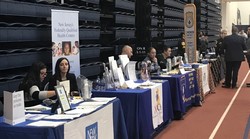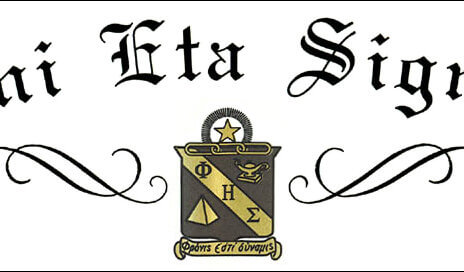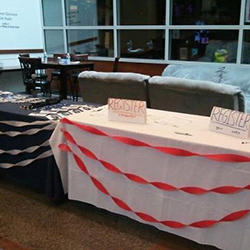A networking event for undergraduates in the fields of Journalism and PR, Interactive Digital Media Concentration (IDM), Communication Studies, and Radio and TV was hosted in Wilson Hall on Monday, Nov. 11th.
The event allowed communication students to speak with field professionals in order to learn more about securing a job post graduation.
Larissa Cardozo, Associate Program Manager of Integrity Continuing Education, Inc, detailed the type of communication-based graduate that companies often seek during their hiring processes.
“I think the nice thing about communication is that it’s diverse and everybody has something to bring to the table,” Cardozo said. “We’re definitely looking for someone with people skills… who is organized and motivated, as well as a team player.”
A Monmouth graduate with a degree in communication studies, Cardozo explained how skills learned during her undergraduate years carried over into her professional life.
“I think that more than anything, my position and the company in general is all about communicating with people from all walks of life,” Cardozo said. “On any given day, I could be speaking with banquet managers or talking to doctors at the top of their field, and my communication skills that I learned [at Monmouth] really helped with being able to talk to those types of people and not collapse underneath the weight of it.”
Gina Columbus, Managing Editor for OncLive and spokesperson of MJH Life Sciences, encouraged communication students to seek job opportunities not seemingly related to their field.
 “If you’re graduating with a communications major, think outside the box a little bit,” Columbus said. “You don’t necessarily have to put yourself into TV, the newspaper, or radio. I never thought I would be doing medical writing, or traveling all over the world, and I do that now.
“If you’re graduating with a communications major, think outside the box a little bit,” Columbus said. “You don’t necessarily have to put yourself into TV, the newspaper, or radio. I never thought I would be doing medical writing, or traveling all over the world, and I do that now.
“If a career path seems interesting, despite having little to do with one’s own experience, it is worth investigating and speaking with the professionals involved,” Columbus explained.
“You’re not going to regret [networking],” Columbus said. “You will only regret it if you don’t make that introduction or don’t take that brochure home. It’s very important to just go for it. This is the time to do it.”
Caitlin Garza, a sophomore communication student, appreciated the different range of professionals who could provide career advice.
“Everyone is very approachable,” Garza said. “I’m not completely sure which exact type of communication path I want to pursue, but being able to hear so many different opinions is beyond helpful. Being able to see how different paths lead to different careers is inspiring, and I feel like finding a job after graduation is more attainable than I once thought.”
Lisha Samuel, a graduate assistant at the Department of Communication, represented Monmouth’s communication master’s program and explained the benefits of participating in graduate studies.
“Having a masters [degree] is not like an undergraduate degree,” Samuel said. “I feel like after graduate school, you’re putting new skills to use in the field. There’s a lot of options for graduate studies to take.”
Samuel also detailed the Interactive Digital Media concentration available to graduate students, and the benefits of participating in such a technologically advanced research lab. “You can put your technical skills into use,” Samuel said.
Connor Hughes, lead Jets writer for The Athletic and Monmouth alumni, expressed the significance of networking events for undergraduates, as the job market for communication-based fields is increasingly competitive.
“I think it’s super important about who you know, as much as what you know in this field,” Hughes said. “If you want to go into news, lifestyle, entertainment, or sports like me, it’s so competitive to get a job.”
Hughes showed an interest in sports writing at a young age and soon realized that many other young, football loving kids could be having the same dream in mind. Standing out from the crowd became a point of concern, Hughes said.
“You need to find a way to separate yourself,” Hughes explained. “You separate yourself by doing your work, but also meeting people and networking to get your name out there. When the time comes for a job, you can reach out to anyone that you meet [at networking events]. You can say
‘Hey, I’m looking to enter in the field, do you know of any anything that’s open?’”
PHOTO COURTESY of Monmouth University



